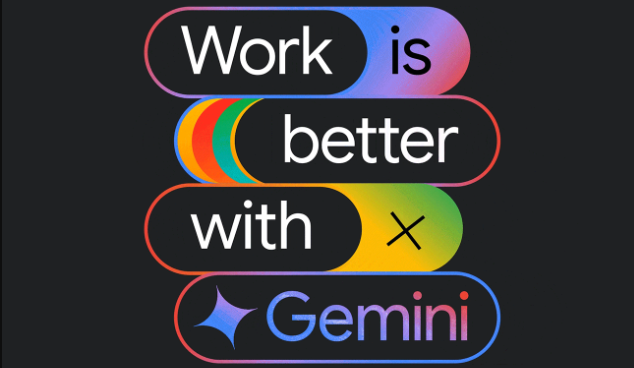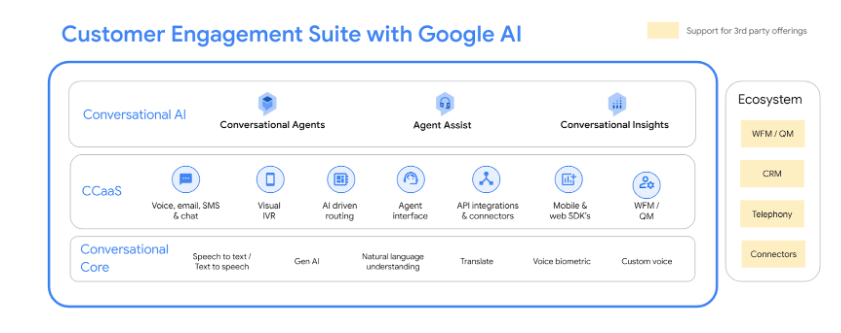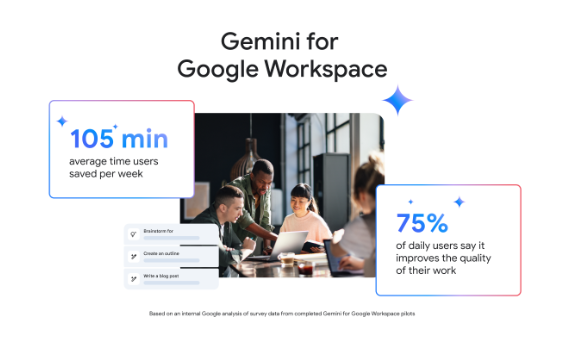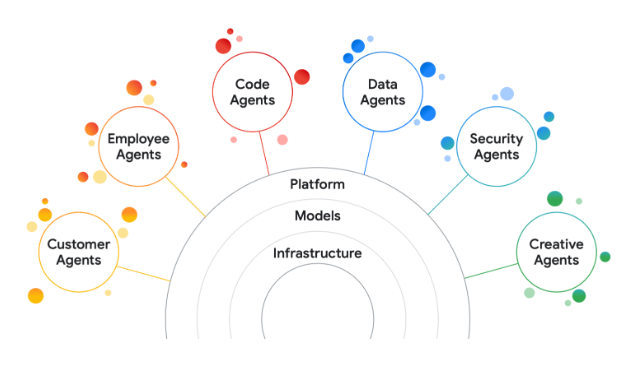 AI
AI
 AI
AI
 AI
AI
Google Cloud said today it’s expanding its leadership in the world of artificial intelligence agents with a new set of generative AI models that are specifically targeted at customer engagement applications, integrated within its Contact Center AI services.
The new Customer Engagement Suite, announced at Google’s virtual Gemini at Work online event, is powered by Google’s most advanced family generative AI models, Gemini. The Gemini models are also being integrated with the Google Workspace platform, the company announced today. With the announcement, it’s aiming to help employees at companies of all sizes work more productively.
In addition, Google also used the virtual stage to talk about how dozens of existing customers have put its AI Agents to work across a range of business applications.
AI agents are intelligent systems based on generative AI that go beyond simple chat applications and predictions, taking actions on behalf of users to make them more productive. The best known types of AI agent are probably the image generation models, like OpenAI’s DALL-E 3, Google DeepMind’s Imagen and Stability AI Ltd.’s Stable Diffusion XL model, but that’s not the only task they can perform.
In a blog post, Google Cloud Chief Executive Thomas Kurian explains that AI agents are designed to achieve very specific goals, such as helping a shopper to find a perfect pair of shoes, assisting an employee in finding the right healthcare benefits, or supporting nursing staff with smoother patient handoffs during shift changes.
Google has identified six categories of AI agents: employee agents, code agents, data agents, creative agents, security agents and customer service agents.
Today’s main announcement is focused on the last, with Google’s new Customer Engagement Suite in Contact Center AI providing its customers with access to a range of AI agents that can assist customer support agents and automate some of their tasks.
It’s said to be powered by the Gemini 1.5 Flash model, and brings advanced conversational AI capabilities to the omnichannel functionalities of its flagship contact center-as-a-service platform.
In a separate blog post, Duncan Lennox, Google Cloud’s vice president and general manager of Applied AI, said the Customer Engagement Suite in Contact Center AI offers four key benefits, with the primary one being its omnichannel capabilities. What this means is that contact center teams can put virtual agents to work across multiple channels, including web, mobile, voice, email and chat applications, automating responses to customer inquiries.
It also supports multimodal capabilities, meaning it can understand text, voice and images uploaded by customers, plus rule-based controls that allow it to understand and process various queries. For instance, if a customer is calling their bank, they’ll likely be required to verify their identity by answering some verification questions.
Google says the Customer Engagement agents can handle this, and also field other types of queries, such as if the customer asks what the bank’s best mortgage deal is. It can even compare the mortgage package it suggests with others that the bank offers, Google.

In addition, Google said, the Customer Engagement agents are grounded in data via Agent Assist capabilities to ensure the highest level of accuracy in their responses. What this means is that their responses will be based on the customer organization’s own internal data and knowledge bases, which inform their outputs.
Google claims these capabilities help set its customer service agents apart from similar offerings, to deliver “exceptional and consistent experiences” across every channel. In addition, customers can tap into an ecosystem of third-party apps for contact center operations, such as telephony systems, workforce management applications and customer relationship management platforms like Salesforce, SAP, ServiceNow and Microsoft Dynamics.
Early adopters of Google’s Customer Engagement agents include Snap Inc., the creator of Snapchat, which has developed an AI assistant called My AI. It can respond to various user requests within Snapchat. For instance, if a user asks My AI to translate a photo of a street sign or a menu in a foreign language, it will do so immediately. Alternatively, the user might take a video of various snacks being sold in a shop, and ask My AI which one is the healthiest option, and it will respond accordingly.
In a second announcement, Google said it’s aiming to enhance productivity for every kind of business with the integration of the standalone Gemini app in the Google Workspace platform, for Workspace Business, Enterprise and Frontline subscribers. Google Workspace is the company’s cloud-based productivity suite and includes products such as Docs and Sheets.

With the integration, Google says Workspace users will be able to access the power of generative AI, safe in the knowledge that their confidential data will always remain secure, and not be made available to Google’s models for training purposes.
The integration provides basic AI assistant capabilities across the entire Workspace suite, and customers will be able to decide for themselves how the Gemini app handles different kinds of prompts.
In addition, Google Workspace is getting a new “security advisor” that provides additional security insights and data protection capabilities to customers.
Google described the security advisor as a powerful toolkit that’s designed to help customers thwart the latest cyberthreats. It can be thought of as a kind of personal security expert that provides business-tailored insights, actionable guidance and more. It will deliver key security insights directly to the Workspace administrator’s inbox, with customized recommendations to help enhance the organization’s security posture, Google said. This includes a guided experience for implementing recommended threat defenses, account security measures and data protection policies.
The security advisor is exclusive to Workspace Business edition subscribers, and will roll out in the next few weeks, Google said.
Aside from the new AI features, Google used the Gemini at Work event to showcase what dozens of its customers are doing with its AI agent offerings.

With regard to its employee agents, which are designed to streamline processes, manage repetitive tasks and answer employee’s questions, it highlighted how a company called Click Therapeutics Inc. is using Gemini for Workspace to transform complex data operations into actionable insights, so it can rapidly pinpoint ways to improve the patient experience in clinical trials.
It also revealed how Dun & Bradstreet Holdings Inc. is using Gemini-based agents to generate emails with tailored, personalized communications to sales prospects and customers it wants to survey for research purposes. Meanwhile, the pharmaceutical company Elanco Animal Health Inc. is using AI agents to support business processes around clinical insights, customer orders and drug safety, resulting in an estimated return on investment of $1.9 million since going live last year.
Google also offers so-called data agents that are designed to answer questions around internal and external sources, synthesize research and more. One company that’s putting these to use is the chemical manufacturing giant Bayer AG, which has developed a “field answers” app that’s able to provide instant answers for agriculturalists in any location, so they put sustainable farming techniques into practice in any situation. Another customer is Ipsos Group S.A, a market research firm that has created a data analytics tool grounded in Google Search to assist its researchers.
As for Google’s security agents, they’re designed to automate security monitoring, implement cybersecurity controls as specified by internal policies, and even aid in cyberattack investigations. They’re used by customers including Apex Fintech Inc., which has accelerated the development of complex threat detection tools from hours to just a few seconds, and Fiserv Inc., which is using Gemini is Google’s SecOps platform to summarize threats and propose responses to the vulnerabilities it discovers.
Finally, Google offered a few insights into how companies are using its creative AI agents to aid in design and artistic expression. For instance, Formula E, the organizer of the ABB FIA Formula E World Championship motorsport series, is using generative AI to create realistic, humanlike commentaries of each race, grounded in data on each competing driver and vehicle.
It also talked about how the South American media group Globo Comunicação e Participações S.A is using AI to hyper-personalize streaming content for individual users, and how Puma SE, the athletic apparel and footwear brand, is using its Imagen 2 model to generate dynamic and personalized product images.
“We continue to work hard to partner with customers to help them deliver real business value in the form of incremental leads, conversions, sales, and profits,” Kurian said. “We are committed to taking a bold and responsible approach to make AI helpful for everyone, helping organizations of all sizes solve real-world challenges in entirely new ways.”
Support our mission to keep content open and free by engaging with theCUBE community. Join theCUBE’s Alumni Trust Network, where technology leaders connect, share intelligence and create opportunities.
Founded by tech visionaries John Furrier and Dave Vellante, SiliconANGLE Media has built a dynamic ecosystem of industry-leading digital media brands that reach 15+ million elite tech professionals. Our new proprietary theCUBE AI Video Cloud is breaking ground in audience interaction, leveraging theCUBEai.com neural network to help technology companies make data-driven decisions and stay at the forefront of industry conversations.